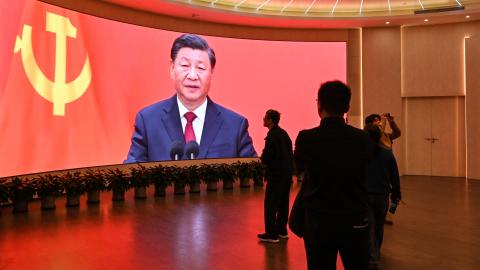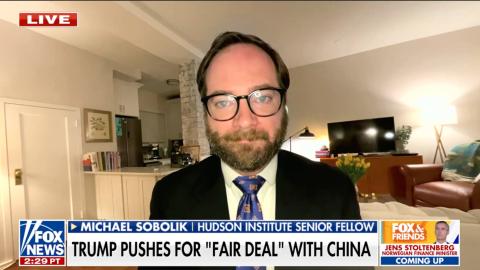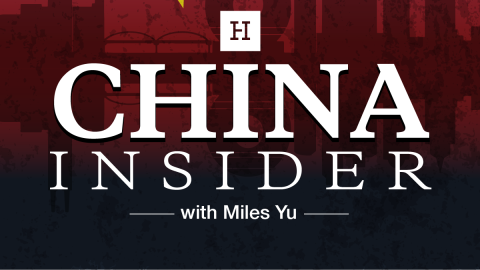
Event will also air live on this page.
Inquiries: eheller@hudson.org
Homeland Security and the China Challenge: A Conversation with Congressman Mark Green
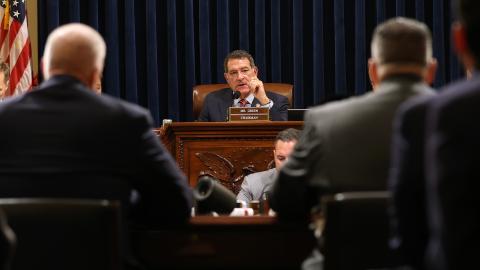
Event will also air live on this page.
Inquiries: eheller@hudson.org
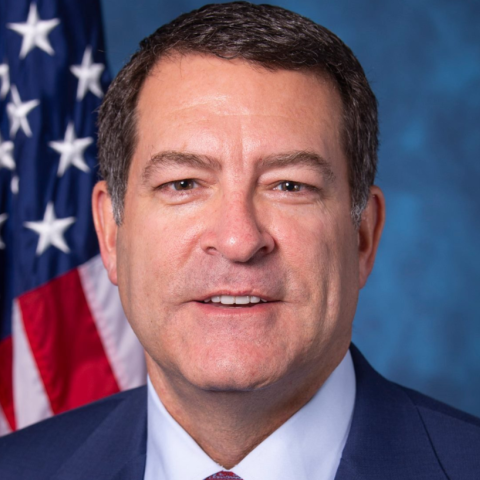
United States Representative, Seventh District of Tennessee

Former Senior Fellow
Jonathan Ward was a senior fellow at Hudson Institute.
The Chinese Communist Party’s successful efforts to breach American telecommunications networks, target critical infrastructure, and support a fentanyl epidemic that has now killed hundreds of thousands of Americans show that China poses a considerable threat to the United States. To overcome the threat posed by the People’s Republic of China and its axis of partners, Washington needs a strategy to counter these homeland threats in addition to a broader American grand strategy.
Congressman Mark Green, chairman of the House Committee on Homeland Security, will join Hudson’s Dr. Jonathan Ward, author of China’s Vision of Victory and The Decisive Decade: American Grand Strategy for Triumph over China. They will discuss the importance of cybersecurity, critical infrastructure defense, maritime and border security, the fentanyl crisis, and more amid America’s rising confrontation with the PRC.
Event Transcript
This transcription is automatically generated and edited lightly for accuracy. Please excuse any errors.
Jonathan Ward:
Congressman Mark Green a congressman from Tennessee who’s the chair of the House Homeland Security Committee. He’s a successful business person, a decorated combat veteran, and also an emergency room medical doctor, so quite a range of competencies here. He’s also been, I think, a very significant voice on China in the House of Representatives.
I want to read one paragraph from your official biography, which is just a great one. “Congressman Mark Green grew up on a dirt road in Mississippi. After graduating from West Point, Green came to Tennessee during his last assignment in the Army as the flight surgeon for the Premier Special Operations Aviation Regiment, known as 160th SOAR. As a Night Stalker, Green served three deployments to Iraq and Afghanistan during the war on terror. His most memorable mission was the capture of Saddam Hussein. During the mission, he interviewed Hussein for six hours, and the encounter is detailed in a book Green authored called A Night With Saddam. Congressman Green was awarded the Bronze Star and the Air Medal with the V Device for valor, among many others.”
Today, we want to get into a wide range of issues related to China. For myself as a senior fellow at Hudson working on US-China competition and covering China issues, I’ve recently come to a pretty deep appreciation of how Homeland Security is right at the heart of this. It might be one of the most important elements of the China challenge that we face. The Homeland Security Committee covers cybersecurity, infrastructure protection, border security and enforcement, emergency management and technology, counterterrorism, law enforcement and intelligence oversight, investigations and accountability as well as transportation and maritime security. So we have a lot to cover.
Congressman Mark Green:
Yeah, there’s a lot in there. That’s right.
Jonathan Ward:
Indeed. But first I’d like to ask you something that I think is on a lot of people’s minds, and I’m getting this question a lot. What can you tell us about the drones flying around New York and New Jersey? I’m sorry, I just have to ask.
Congressman Mark Green:
No, it’s great. Well, the problem is is that we can’t tell you a lot. We know for a fact that some of it is manned aircraft. We know that there are drones that are legitimately out there. We also know that this news has got everybody looking at the skies now and seeing things that maybe they wouldn’t have noticed before that we’re probably manned aircraft, things like that. We also know that there are drones that we don’t know about. When the DOD or the DHS says, “We have no evidence that it’s a foreign entity or some criminal activity,” that means they don’t know what it is, and that’s not good enough. Just last week, the FBI arrested a Chinese national who flew a drone over Vandenberg Space Force Base. He was trying to leave the country when they actually arrested the guy. So tying this to China, we have clear indications they’re flying drones in the United States over our sensitive sites. So we need answers. We need them fast.
I have a bill right now in Congress. It’s been challenging to get it done because it crosses three different jurisdictions in the House: Homeland Security, Judiciary, and Transportation because the FAA has something to say about what happens in American airspace. But one thing that’s really important to know is that NORTHCOM right now has the authority to shoot these things down, just like it did the spy balloon, the Chinese spy balloon. Yet, we don’t have a drone. If you really want to find out what’s going on with a drone, you catch it, you download, you hack it, you download its flight path, you get all the data, and you trace back to where the remote was flown from. Until you have the drone, at least in the non-classified space, you don’t have the data. So big question mark, really, unfortunately, and that’s not acceptable.
Something else that’s not acceptable, the military knew about the Chinese spy/weather balloon well before it got to Montana. But an American with a camera caught a glimpse of it, and that’s how we as Americans found out about it. They’ve known about these drones since early November. We found out about it why? Because someone went out with a video camera and told us. I don’t know if you saw Governor Hogan’s video, got to work on his video skills a little bit, but he did a great job of showing us drones basically right over his house, and a great tweet. I don’t know if y’all caught that.
So this is unacceptable. We need an answer. My bill would not only advance the current authorizations for DOJ, DHS, and DOD, but it would also authorize state and local under parameters because, look, it is airspace, and we don’t want them shooting down a manned aircraft and all that stuff. We got to coach them on how to do it and what to do it with appropriately, etc. So those constraints are in my bill. There’s a version in the Senate that doesn’t have some of those constraints. Those are important constraints. Our bill in the House does that. It’s a meticulously put together bill, and we got to get it passed.
Jonathan Ward:
Okay, thanks. So still a big question mark-
Congressman Mark Green:
Yeah, a big question mark.
Jonathan Ward:
. . . we got to touch on that one. But bottom line, when it comes to China, we have cybersecurity, critical infrastructure, drones, ports, fentanyl, border security, a whole lot. I want to get into all of those in the course of our hour.
Congressman Mark Green:
Yeah, sure.
Jonathan Ward:
But first I’d like to ask you to give us your own overview of the China threat, the challenge posed by China and the way in which Homeland Security fits into the overall strategic competition with the Chinese Communist Party.
Congressman Mark Green:
Well, first let me say, and I should have done this on my first answer, first question, thanks to the Hudson Institute for having me. Your book is a seminal work.
Jonathan Ward:
Thank you.
Congressman Mark Green:
I know you’ve had a couple, but Decisive Decade is excellent. If you haven’t read it, you need to read it. I put it up there with Hundred-Year Marathon, another Hudson fellow, Michael Pillsbury. If you haven’t read that book, Decisive Decade, you need to get it and read it.
Jonathan Ward:
Thank you.
Congressman Mark Green:
The threat. The best way to look at the current leadership of China is to go back and study the Qin Dynasty. It’s a legalistic authoritarian regime that is influenced by the imperial history of China as well as the communist ideology. They are ruthless in their own country, and they adhere to that Sun Tzu maxim that two tigers can’t live on the top of the same mountain. So their goal is to unseat the United States as the sole global superpower, period.
They have invaded our infrastructure, which is under Homeland Security, protecting power, water, dams. All those things that are really important critical infrastructure, the Department of Homeland Security has the responsibility of protecting. Volt Typhoon got into all of those and puts us at massive risk. The telecommunications, of course, CISA has this unique authority to protect the .gov domains. Now, DOD and Cyber Command, they handle their own. But the rest of the government, CISA is responsible for as well as assisting our private sector.
We’re in this massive transition in the United States between the paradigm that our private sector will protect itself, and how in the hell can we expect Microsoft, Google to protect themselves against a nation state? That’s what they’re going up against now. So I’m pushing this notion that, no, that is a sovereignty of the United States, a border of the United States. It must be protected and we have to help, the government has to partner. CISA has currently the role of doing that. That is gathering information on vulnerability, sharing vulnerabilities to the industry.
But industry also has a responsibility here, and this is also part of Homeland Security. I had Microsoft come before us. I’ve had CrowdStrike’s leadership come before us and say, “What the heck? Your failure with some basic principles resulted in the compromise of government officials emails,” in the case of Microsoft, and the case of CrowdStrike, “The way you did your update screwed over the system.” Now, it was a training exercise, to a certain extent, prepared us for what it might look like if all these critical infrastructures were compromised by a cyber attack.
Look, the threat is real. China is doing everything it can. Who knows? Maybe they want us to know they’re in there. That in and of itself is bad. Because if they do go and try to take Taiwan, they don’t want us to respond. So they want to know the knife is at the throat. They want us to know the knife is at the throat. That’s how they think. Go back and read the Warring States period. This is how they think. So they would rather not fight the battle and show you that they are positioned with the ultimate weapons. So maybe all this, they wanted us to find them. Who knows? That’s speculative on my part just from my study of Chinese history. But the threat is real, and Homeland is at the heart of protecting our country.
Jonathan Ward:
Great. I wanted to double click on that a little bit more on cybersecurity. The two major Chinese cyber attacks that we’ve heard about this here with Volt Typhoon-
Congressman Mark Green:
Volt and Salt.
Jonathan Ward:
. . . right, Volt and Salt. Can you walk us through in a little bit more depth Volt Typhoon, Salt Typhoon? Then, how can we respond to this? What really should we be doing about this?
Congressman Mark Green:
First off, Volt is critical infrastructure, so think water systems, power plants, they got in those systems, the ability to control mechanisms of those systems. Salt Typhoon is one that’s very recent. That’s eight telecommunications companies. They downloaded terabytes of data to include. . . The nexus was pretty much Washington, DC, so you can think through who they’re targeting, whose phones they want to be on. They did target political campaigns as well. Most of us here in DC, our phones have been compromised. Your text messages, who you texted, who you called and when, your geo-location, all that data is now in the hands of the Chinese Communist Party. And I can tell you this, and I specifically asked in the classified briefing if I could say this, it’s in the open source information, I can confirm, they’re still in the system. So Volt, Salt. The second part of your question was?
Jonathan Ward:
What should we be doing about this?
Congressman Mark Green:
What should we-
Jonathan Ward:
How should we respond?
Congressman Mark Green:
Look, we don’t have a national security strategy on cyber response. If you hit the United States with a nuclear weapon, we have the response. Actually, we have first use on nuclear. I think we’re one of the few countries that say, “We’ll go nuclear on a kinetic strike against the United States or US assets or allies.” We have no statement on what we’ll do if you hit us with cyber. Those are two prominent cyber attacks. It’s time we go on the offensive. I don’t mean defensive, I mean offensive. It’s time to strike back. We need to make the world aware that we have the capability. China needs to know where the knife is against their throat. I’m confident that our team has capabilities that are potentially, I think, beyond the Chinese. We just need to let them know.
Jonathan Ward:
You mentioned Microsoft, and you had Brad Smith, the vice chair and president of Microsoft, testify to your committee this year. Just to give people a sense of the scale of the general cyber domain here’s what he said. He said, “In the 28 months since the Russian invasion of Ukraine, as tensions have grown elsewhere, we’ve seen more prolific, well-resourced and sophisticated cyber attacks by four countries: Russia, China, Iran, and North Korea. During the past year, Microsoft detected 47 million phishing attacks against our network and employees. But this is modest compared to the 345 million cyber attacks we detect against our customers.” Then he said every day, and I had to check that, every day 345 million cyber attacks. Is that for real?
Congressman Mark Green:
Well, a lot of it’s AI-generated now. The attacker’s using AI, and they can do millions of attacks in a very short period of time with the use of AI. I don’t know how Brad is counting his intrusion attempts, but the capabilities are certainly there to achieve that.
Jonathan Ward:
Fair enough.
Congressman Mark Green:
Imagine what happens when it’s a quantum attack.
Jonathan Ward:
You’ve touched on the role that the private sector should play in this, so maybe we’ll come back to this. Let’s go a little bit more into critical infrastructure. The outgoing FBI director has been pretty vocal on China, I think. He said, “The PRC has made it clear that it considers every sector that makes our society run as fair game in its bid to dominate the world’s stage, and that its plan is to land blows against civilian infrastructure to try to induce panic and break America’s will to resist.” Then he says, “The fact is the PRC’s targeting of our critical infrastructure is both broad and unrelenting. It’s using that mass, those numbers to give itself the ability to physically wreak havoc on our critical infrastructure at a time of our choosing.” I feel like our national conversation on this should be much more substantial than it is. What else could we do?
Congressman Mark Green:
The Neville Chamberlains of today are the ones that are out saying, “No, this is no big deal. They’re an economic partner. We should go and do more business with China.” Those are the Neville Chamberlains of today. But we’re in a conflict with China on multiple levels, and too many people are asleep at the wheel.
Look at the crane issue, 80 percent of cranes manufactured by one company from China. We discover now there are modems on these that can communicate what they see back to China knowing exactly which military units and aircraft and tanks and jeeps are loaded on which ships. “Well, now we know which ship to sink.” This is insanity that we’ve just allowed this to happen. Our committee, along with Gallagher at the time and now Moolenaar, did this investigation into the cranes and discovered these modems that allow them to monitor what we’re doing. You think about the economic data, knowing what goes through which port, it’s all about data analytics now for business, anyway, and understanding who’s buying what and where and how, supply chains, etc. Well, they have all that data because they’re sitting there running every crane in America’s ports. I’m not sure I answered your question, but I didn’t mind pontificating a little bit there.
Jonathan Ward:
Sure, sure. Why don’t we turn to supply chain security, which is actually in the Homeland Security strategy for China that came out, I think, in 2020 or 2021. So during COVID-19, China’s primary newspaper, the China Daily, and I cited this in Decisive Decade because it made its way to Congress’s floor into the Senate records, the China Daily threatened to, quote, “Plunge America into the mighty sea of coronavirus by withholding life-saving drugs from the United States.” Then the CCP also nationalized the control and production of medical supplies in China, including factories that are owned, and I put owned in quotes, by US multinationals like 3M. Where is Homeland on this issue of supply chain security? What can we do to accelerate this? How can we deal with things like pharmaceuticals, which we know are incredibly important? Then also we could touch on critical minerals or other areas that you’re looking at.
Congressman Mark Green:
Well, first I sit on Foreign Affairs, and most of this stuff is Foreign Affairs, not so much Homeland because it’s trade-related and there’s a subcommittee on International Trade in the Foreign Affairs committee. It starts at the source. So I have a bill, two bills actually, one, nearshoring which would create a private industry, private lenders lending through the Development Finance Corporation, two businesses to cover the costs of the move to Latin America or the Caribbean, for those industries where the labor costs, it wouldn’t fit the business model if they came to the US. I have a second bill that would incentivize businesses to come to the United States by expensing the cost of the move 100 percent year one, which would be a massive incentive to business to come back to the United States, again, where the business model works and the labor costs inside the United States. But we have got to start there.
That’s where we come in with the private sector and say, “Look, yeah, you can make money, but we need you to think about your country and put we before me, the country before your bottom line here, and start manufacturing in places like Guatemala, Mexico, Monterrey, an incredible high-tech sector in Mexico. If you can’t afford the American labor force, build in Latin America, shorten the length of the supply chain, and then create jobs down there that might decrease pressure on our southern border. So nearshoring is a great solution to a lot of different problems. Then in the transit and the port systems, we’ve already talked about that issue with the supply chains. We can’t allow them to have the data or to control the cranes from remote. We just can’t do that. So those are some of them.
Jonathan Ward:
On the cranes issue, ZPMC, which is the company that makes the cranes, it’s actually a subsidiary of China Communications Construction Corporation, which is the main Chinese SOE that builds the Belt and Road.
Congressman Mark Green:
That’s right.
Jonathan Ward:
I pointed out in China’s Vision of Victory that that was also the company that built the militarized island. So we’re really dealing directly with one of the nastiest-
Congressman Mark Green:
It’s the CCP.
Jonathan Ward:
Yeah. And at the same time, what our private sector was saying about the cranes was that they have no alternatives in the US. I guess your bill, the Western Hemisphere bill is meant to address that and other issues.
Congressman Mark Green:
Let’s get to the chips because that’s probably the biggest one. 92 percent of high-end semiconductor chips are made in Taiwan. That’s a huge risk. So we as Congress, I think two years ago, passed the CHIPS Act. That’s a federal expenditure of billions of dollars to incentivize companies to make chips here at home. Those plants are in construction. They’re probably midway through the process at this point. We have to do that for any number of industries.
Now, again, we’re broke as a country. We’ve spent a ton of money. We have deficits that are nauseating when you think about them. But we’ve got to protect our national security. That is the Constitution’s prime directive, I guess. So we’ve got to figure out solutions on how to make these. . . We do have friends who make cranes in the Scandinavian countries. We also need to be able to take the cranes we have very quickly and disable the ability to communicate back. So there are bills out there with directing task forces to assess how to do that in the near term, and in the long term, we have to buy cranes from people who are friendly.
Jonathan Ward:
So essentially a rip and replace.
Congressman Mark Green:
With a rip and replace, ultimately. But you can’t replace 80 percent of our cranes in a day, so we need to disable the ability for the current ones to talk back home.
Jonathan Ward:
Fair enough. Let’s go to fentanyl, which I think is one of the issues that even for those of us thinking about CCP grand strategy, this is a real awakening as to what they’re doing to this country. The way I look at it, not even the Soviets would’ve done something like this. The House Select Committee on Strategic Competition with the CCP released evidence earlier this year that demonstrates Beijing’s complicity in subsidizing fentanyl precursors, and the fentanyl crisis has now claimed over 500,000 American lives. Is that accurate?
Congressman Mark Green:
That’s about right.
Jonathan Ward:
That’s right.
Congressman Mark Green:
It’s just under 100,000 a year.
Jonathan Ward:
A year, okay. So more than the total deaths in the Second World War, on an annual basis more than the killed in action from both Vietnam and Korea combined. Here’s what the report says, which is, “The PRC under the leadership of the CCP is the ultimate geographical source of fentanyl. The Select Committee’s investigation has established that the PRC government has directly subsidized the manufacturing and export of illicit fentanyl materials and other synthetic narcotics and given monetary grants and awards to companies openly trafficking illicit fentanyl materials and other synthetic narcotics.” I think this goes way beyond the scope of strategic competition. If anything, it sort of changes the nature of this problem with the People’s Republic of China, at least in my mind. How do we counter this? What can we really do about this in terms of holding Beijing accountable and beginning to combat this epidemic for real?
Congressman Mark Green:
That’s a big question with a lot of pieces and moving parts from the demand side to the supply side. On the demand side, obviously we have seen a decrease in fentanyl deaths because we’ve educated young people that you don’t take an open drink at a bar. You watch how drinks are mixed, for example. When someone says this is an Adderall at a party, you don’t trust that. So as we’ve educated the youth, there’s been a decrease. We obviously have to rehab people who are sick, and those things have to happen. So on the demand side, there are things that we can do inside as a country, and we should be doing those.
On the supply side, we should take offensive, sanctioned actions against China. Look, it’s the most surveilled state in the world, and they can’t find who’s making the precursors and sending them to Mexico? That’s a farce. They know who’s doing it, and, in many cases, they are directly subsidizing those entities. So they’re complicit at a minimum, or they’re actually participating in the death of Americans and the disruption of the base family unit.
Remember, you have to go back and think about how China wages war and really go back to Spring and Autumn, go back to that 250 BC timeframe when Sun Tzu. . . The Art of War was published by someone, but it’s attributed to Sun Tzu. This is how they do it. This is their game, disruption of the society, and they are doing that.
We have to stop the flow. We have to seal off our border. This four years of a wide open, anybody can come in the United States border has done massive damage to the United States of America. There were like 27,000 Chinese nationals who came across our southern border in FY23, 24,000 in ‘23, 37,000 in ‘24, 80 percent military-aged people and, I am able to tell you, many with ties to the CCP. If you look at the 10 years prior to that spike, the largest number was 1,800 in a year. This is a planned strategy of the CCP, and Joe Biden and Alejandro Mayorkas have facilitated this. If you want to deny that, then put the blinders on and be Neville Chamberlain. But this is where we are now, and these 60,000 people are somewhere in our country maybe driving drones.
Jonathan Ward:
Let me ask you a little more about the southern border. It’s a question I got a lot over the last year and a half, maybe two years. The military-age Chinese nationals coming over the border, I’ve heard a few things in an off-the-record context that were pretty concerning about what people in that category were doing once they’d gotten into the United States. But I think there’s generally been a lack of publicly presented evidence on this subject, ties to the CCP, ties to the PLA, activities in the US. It’d probably be helpful to start to share some of that, make that clearer through evidence. Why are we not doing that if there’s anything there, or what can we?
Congressman Mark Green:
The Wall Street Journal published an article, I think it was as much as three years. . . or, no, they were saying that over the past three years, in the article, over 100 instances of Chinese tourists storming military installations with cameras. You’ve seen the mass smash-and-grabs in the Louis Vuitton store. Imagine that with cameras and Chinese tourists at a military installation all with cameras taking pictures of everything. That’s in the Wall Street Journal. That happened, according to them, 100-times-plus. You got the drone pilot. You’ve got this lab that the FBI still isn’t talking to us about that was found in California that had multiple different biohazard biologics. You’ve got the New York City Police station. You’ve got the Houston consulate that was caught shredding and burning secret documents.
Look, China wants to take America down as the global superpower. We’re in a conflict with China, and we just aren’t waking up. These facts are here. Yeah, thank God for books like yours and Pillsbury’s and others who are trying to get this in front of the American people. The Hudson Institute having a discussion like this, this is incredibly important to understand that your cell phone has some Chinese infiltrator and espionage going on right now.
Jonathan Ward:
I’ve got to ask you about TikTok. We’re approaching the deadline here. We’ve just seen Shou Chew down in Mar-a-Lago. Bottom line, we’ve had a litany of national security leaders testifying to the threat posed by this app when it’s under adversary control, but also the company has sued the US government based on laws that have passed in Congress. So the question for you, how are things looking as we move towards the deadline in January? Also, do you expect more use of the US legal system against the US government by companies that have strong China ties or are directly owned in various cases?
Congressman Mark Green:
Certainly, they will continue those lawsuits. They’ll use our own system against us. That’s a no-brainer. The threat with TikTok and really understanding it, it’s twofold from my perspective. One, it’s shaping the minds of the youth. So here we are talking about all these threat things. Meanwhile, TikTok’s telling these guys in that Jedi mind trick thing, “Ah, China’s fine. China’s fine. China’s fine. China’s a friend. China’s a friend.” If you have enough of that, you have people who are like, “Well, China’s a friend. What’s Green saying? What’s Jonathan saying?” So there’s that piece of it, that whole disinformation propaganda war, psychological operations battle.
But there’s also things that are much more subtle. Let me give you an example. There’s a 12-year-old doing a ballerina dance, and she may be president someday. Maybe there’s something in the bottom right corner of her video that would compromise that. She’s a China hawk. So they go to her in a back room and they say, “We’re going to let people know about this video that you did when you were 12.” Think about how spies work. Think about how espionage happens. It could be more compromising than just a ballerina video. It could be some image you texted because now they’re in our phones of your girlfriend or boyfriend. How would you like that being broadcast on the news? Would that cause you just slightly to adjust your verbiage on China? Are you willing to pay that price personally in order to do the right thing?
TikTok is dangerous. It’s fascinating. When he came before ENC, I watched the hearing, nobody asked the question, “Where’s the source code come from? Where do the patches to repair the source code come from?” So I sent the guy a letter after. I said, “Look, I’m chairman of a different committee, and I have just as much power. I can do this under subpoena, or you can answer me now. Where does your source code come from? Where does your patch come from?” His answer, “We’re an international company, and our code comes from all over the world.” “Does it come from China?” “Yes, some of it comes from China.” So the back door to all the data, they invaded our. . . AT&T, tell me they’re not downloading the data from TikTok, a Chinese-tied company.
Jonathan Ward:
I have one more question because we’re reaching the top of the hour. After that, maybe you have time to-
Congressman Mark Green:
Yeah, absolutely.
Jonathan Ward:
. . . take a couple of audience questions. I just want to broaden this out beyond China a little bit but in the context of CCP strategy. We know that Beijing enables a wide variety of adversary states in its global grand strategy. They’re supporting Putin’s war in Ukraine. They’re supporting the Iranian regime and its proxies essentially through investment and trade in the Middle East. All of these actors are clear elements of their strategy to fight the US and our allies. How do you see these forces converging in the context of homeland security? Our main adversaries, China, Russia, Iran, North Korea, are they working together in ways in which come across the homeland security portfolio?
Congressman Mark Green:
So are they colluding? Is your question, are they colluding?
Jonathan Ward:
Well, in the sense of are they colluding in ways that affect the homeland as opposed to the broader general offensive strategies they have?
Congressman Mark Green:
Well, they’re doing some of the same things. Iran hacked a dam. They used ransomware and hacked a dam, I think, in New England somewhere, maybe Connecticut. North Korea is mostly intellectual property theft, ransomware stuff, but they’re also involved in infrastructure. Russia, mostly disrupting healthcare and local governments through ransomware, that kind of thing, but they’re also pinging our defense and infrastructure. So they’re all kind of doing the same thing. The question on collusion, are they working together to do it? I don’t have anything that I could share in this forum on that regard.
Jonathan Ward:
Fair enough. Okay, thank you. Why don’t we take a few questions from the audience with our remaining time? State your name and affiliation. Why don’t. . . in the front row here?
Rebeccah:
Hi. My name’s Rebecca. I’m a Hudson affiliate. Oh, thank you. I’m curious what your top legislative priorities are regarding China next year and how you see this fitting into perhaps the House’s China agenda more broadly.
Congressman Mark Green:
When you drill down to my responsibilities on Homeland and the battle between us and China, I think our greatest issue is our cyber workforce. We have 500,000, you hear all these different reports, anywhere from 500,000 to 700,000 vacancies. Director Wray, when he came before my committee on the worldwide threats, I think it was last year, said that if he took every single cyber person he had and put them on the China desk, China would still outnumber us 50 to one. So I think our greatest. . .
Look, in the broader sense, the big challenge between us and China is over talent. If you go back to the Confucian model and how they managed talent, you had to take a test to work in the government. They get the concept of talent management. We as a nation have got to start thinking about that, too. For example, the International Space Station, we’re unplugging from that. Someone in the Senate the other night lined through “Always keep an American in space” on a bill. That’s bad because all that brain power then just goes. . . China has their own space station. So why would we let them have all that talent?
On cyber workforce, I have a bill called the PIVOTT Act. We’ve passed it out of committee. It probably won’t get done this week. We’re sort of focused on a CR right now. But it’ll be one of my biggest priorities next year. What that is is it’s an ROTC-like program that pays for kids to get technical degrees or four-year degrees. You can actually be in a career and choose to pivot back to cyber, so it’ll take care of midlife folks, anyone who wants to come back and get a cyber technical degree, pays for their education, and then they owe the government.
Right now, we’re paying anywhere from $150,000 to $200,000 for specialists to do cyber work, consultants, when we could pay an employee 90 grand, and they’re paying back their education and the ROI is positive for the country. We’ve got to fix the pipeline. So the goal is to get to 10,000 graduates a year in the PIVOTT Act. That’s probably my biggest legislative priority when it comes to contending against China. All these other things like fixing the cranes issue, task forces looking at telecommunication and stuff like that, that’s important, too. But on the grander scheme, talent management, competing with China on a global scale, this is about workforce and, particularly in my purview, cyber.
Jonathan Ward:
Madam in the purple sweater, yes.
Khushboo:
Hi. My name is Khushboo.
Jonathan Ward:
Yeah, take a mic and state your affiliation.
Khushboo:
Hi, my name is Khushboo. I’m a journalist with SCMP News. My question is regarding TikTok. We saw President-elect Trump saying that it’s close to his heart. He also said that China and US together can solve all of the world’s problems yesterday. How should we understand those statements in respect of what can we expect the next administration to do on China? How can we see Congress and the next administration tackling China together in the years to come?
Congressman Mark Green:
It may sound like duplicity, but the Scowcroft Center came out with a pretty good strategy on how to handle China. I think it was three years ago or so. It talks about those collaborative areas that we should move forward. So the president, absolutely I agree with him on this. There are areas where we should collaborate, move forward on. There are areas where we have got to recognize that they’re trying to unseat us as the global hegemon. So let’s approach that as I’ve indicated throughout the bulk of this talk. But where we can collaborate, we should collaborate; where we contend, we need to contend and we need to do so aggressively. So I would say, sometimes it’s going to sound like we’re saying two different things. But if we are careful about what we collaborate on and careful about what we contend on, I think that’s the step forward. His actual book is really good about the direction for the next decade. So, again, I would read his book.
Jonathan Ward:
Let’s see, in the back, George Washington sweatshirt.
Congressman Mark Green:
I’m not getting a share of the cut there.
Jonathan Ward:
But I appreciate it. That’s kind.
Speaker 6:
Thank you, Congressman. I’m an international student from Taiwan, also studying at the George Washington University Elliott School of International Affairs. I want to ask one question that all of the Taiwanese people right now, 2024, is very desire. . . wanting to know from the US government is that we all know that we facing a threat and also the danger from China and anytime they can intervene us. So my question is that, will the US military come to Taiwan if we really get intervened from China? Thank you.
Congressman Mark Green:
So will we come to defend Taiwan? The strategy of ambiguity has worked pretty well, so I’m going to leave that ambiguous. But I will tell you, we just gave you Typhon missiles, so you’re going to have to read between the lines. Sorry.
Jonathan Ward:
Do we have time for one more?
Congressman Mark Green:
Yeah, sure, I think so.
Jonathan Ward:
Okay, great.
Congressman Mark Green:
I got another several minutes.
Jonathan Ward:
Oh, great. Okay, great. Madam in the back.
Tara McKelvey:
Hi. My name is Tara McKelvey with Radio Free Asia. What do you think about the China Initiative, and do you think it will be reinstated?
Congressman Mark Green:
Those words mean different things to different people. There’s the 2025. Are you talking about Belt and Road? Are you talking about all of that together? What do you mean by China Initiative?
Jonathan Ward:
It’s the Department of Justice.
Tara McKelvey:
Yeah, yeah.
Congressman Mark Green:
The DOJ’s piece, oh, on our side, not their side. Yes, I think you’ll see that reinstated.
Jonathan Ward:
Gentlemen in the back on this side.
Steven Basan:
Good morning, sir. My name’s Stephen Basan. I’m from the Chief of the National Guard Bureau. I am wondering, you made the comments about military-aged males coming across the border, and I’m wondering if you can speak a little bit more to that as far as, do you think that the PLA personally is sending people across the border in order to form military units in the United States? Is there any way from differentiating these potential PLA members from the Chinese who are coming across the border and just want to escape a very oppressive regime? Thank you, sir.
Congressman Mark Green:
Well, it’s really hard to know intentions. Because of the flow of migrants created by opening the gate, opening the door, the questions at the border went from 40 questions in vetting to five, so all these people got five questions instead of 40 questions on the vetting process. So we don’t know. We do know this. There are 39,000 Chinese nationals who have detention or denied. . . they’re supposed to go home, be taken home by ICE. Of course, they took 109 last year.
Your real question, though, is what’s my opinion about the reason they’re here. That was the first part of your question, I think. You have this migration that’s like this in a country where you can’t get a plane ticket unless your social credit score. . . The CCP knows when you leave China. So you got a peak of 1,800, and then suddenly there’s a massive spike. 80 percent are military age, many of whom are former PLA members or at least CCP members. It would be foolish not to assume that there is some threat in that, whether it’d be espionage or sabotage, worst case, sabotage, minimal case, espionage. I would submit to you, we’ve already seen the espionage from the guy we just captured or arrested last week.
We don’t know about the other. We don’t know. Would they disrupt the rail movements to defend Taiwan? Would they disrupt the railhead or the barge point, sending those military units to port that they would then get on a port and go to defend Taiwan? We don’t know. But, look, the modus operandi, this whole process has been vetted. It’s what Russia did in Ukraine. They sent the little green men in, they migrated in, they sat there, they built homes in the Donbas, and suddenly there they were.
Jonathan Ward:
Take one more, blue sweater.
Natalia:
Hi. My name is Natalia. I’m a student at the University of Florida. You discuss nearshoring priorities in Congress, go Gators, and shortening supply chains by encouraging companies to produce in Latin America. But China does have a presence in Latin America, whether their involvement in the Chancay port in Peru, or they’re funding railways in Mexico. What do you foresee a strategy looking like when encouraging American companies to produce in Latin America? Will there be conditions to co-existing with Chinese involvement in these countries, or will there be stringency in terms of how these companies will operate and conduct business in Latin America?
Congressman Mark Green:
What you’re really asking is, how do we contend against the Belt and Road Initiative, which is, at its heart, designed to take allies from the United States? I have a book I’m writing right now called The Polarity Cycle and how. . . If you look at Westphalia, so the end of the Thirty Years’ War, everybody’s exhausted, which is what happens after a long conflict, and they’re almost ready for peace at any terms. In fact, even in the peace agreement, the way they built the room where the peace treaty was held is there was a door for every country, small, large, didn’t matter, and everybody entered at the exact same time. In that peace process, everybody’s kind of considered equal.
So that exhaustion phase after war, there are many, many, many, many poles in the system. But as you move from that, the larger countries tend to start collecting allies because the smaller countries can’t defend themselves. In that balance of power phase, there’s this coming together, and it transitions into a true alignment phase where everybody’s picking sides. Before long, you’ve got a bipolar region or a bipolar world. That’s when, I think, war happens again. I’ll be making that point in this book. Look at the Napoleonic Wars, the War of the Spanish Succession, World War I, World War II, you see all this alignment that occurs and then there’s a bipolar world right there.
I said all that to say that as it relates to Latin America, as it relates to Africa, as it relates to Belt and Road Initiative and all of this, the Chinese get it. There’s an old axiom, I think, from Sun Tzu, but if not from him, Xunzi, Mencius, one of the guys from that Warring States period authored, “A friend afar can help protect you from an enemy that’s near.” I think China sees us as near not far. So they’re gathering friends all over the world really to contend against us, and the world is aligning again. That’s why I often like the fact that India operates sort of with one foot in each camp because it helps us sustain a multipolar world. I agree with Richard Haass that multipolarity is a more stable. . . If you can’t have a global hegemon that is benevolent like we’ve had over the past decades or so, since ‘89, then I’ll pick multipolarity.
But in that battle royal for the allies, what can we do? Well, there’s aid. There’s bringing our businesses here. You talked about a very detailed piece of that. Do we say to our American businesses that go and work in Monterey, “You can’t affiliate with any of the Chinese that are there”? Well, that gets really difficult. Right now, the drones that are made in America, these are the ones made in America, still have parts made in China.
So splitting those hairs, I think that’s a very hard question to answer and would be very difficult to achieve. That doesn’t mean we don’t try. But we’re in a battle for allies, too. We’re in a battle for friends. We have to do everything we can. There are initiatives in Congress right now to create this Prosperity Security Initiative for Latin America that would, in some respects, look a little bit like the Monroe Doctrine resurrected, which you have to be very careful about that. We want to see Latin America be successful. We want to see us be a good neighbor to them, them be a good neighbor to us. We want to make sure that we’re not losing in that battle for allies as the world becomes bipolar. I don’t know if that answered your question, but your question was very specific. I want to talk about the general because getting to the specific is harder. But you’re right. We got to get there.
Jonathan Ward:
Well, thank you, Congressman. Thank you, everybody.
Congressman Mark Green:
Yeah, thanks for having me.
Jonathan Ward:
The key thing here is, as you mentioned, an adversary that’s near not far. That’s been the main takeaway I’ve had in recent years in the US. Despite being a scholar of Chinese global strategy, what they’re doing here, whether it’s cyber, whether it’s fentanyl, whether it’s critical infrastructure, whether it’s United Front Work Department, there’s so much activity going on here that it just seems very clear that homeland security must be one of the key pillars of a successful US strategy to actually overcome this challenge and win the entire picture, which is what we’re going to have to focus on doing. So thank you for work-
Congressman Mark Green:
Thank you. Thank you for having me.
Jonathan Ward:
. . . in Congress and your voice on this issue. We’ll continue to prioritize and study these here at Hudson and beyond. So thanks so much.
Congressman Mark Green:
That sounds great. Thank you for what you’re doing.
Jonathan Ward:
Yeah.

Please join Venezuelan opposition leader Leopoldo López for a discussion on the future of Venezuelan democracy, the role of civil society in credible political and economic reforms, and the pathway to free and fair elections.




Join Distinguished Fellow Mike Gallagher and Congressman Rob Wittman (R-VA) for a discussion on the congressman’s recently introduced Securing Essential and Critical US Resources and Elements (SECURE Minerals) Act and Congress’s role in securing America’s economic security.


Hudson Institute’s Center for Peace and Security in the Middle East will host Sir Liam Fox for a conversation on the evolving geopolitical landscape in the Middle East.

